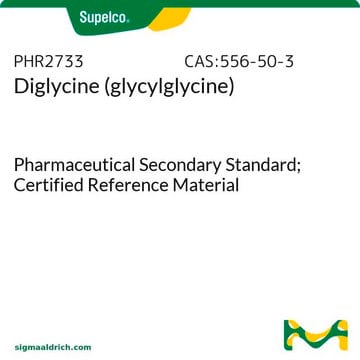G0674
GlycylGlycine
Pharma Manufacturing
Synonym(s):
Gly-Gly, Diglycine, Glycyl-glycine
Sign Into View Organizational & Contract Pricing
All Photos(2)
About This Item
Linear Formula:
NH2CH2CONHCH2COOH
CAS Number:
Molecular Weight:
132.12
Beilstein:
1765223
EC Number:
MDL number:
UNSPSC Code:
12161700
NACRES:
NA.21
Recommended Products
biological source
synthetic
Quality Level
form
powder
impurities
heavy metals, tested
useful pH range
7.5-8.9
pKa (25 °C)
8.2
suitability
suitable for manufacturing use
SMILES string
NCC(=O)NCC(O)=O
InChI
1S/C4H8N2O3/c5-1-3(7)6-2-4(8)9/h1-2,5H2,(H,6,7)(H,8,9)
InChI key
YMAWOPBAYDPSLA-UHFFFAOYSA-N
Looking for similar products? Visit Product Comparison Guide
General description
Our SAFC® portfolio of high-quality products for biopharmaceutical processing withstands strict quality control procedures and is produced according to MQ-500 requirements as defined by the M-Clarity program.
M-Clarity Program
Our comprehensive portfolio of upstream process chemicals not only provides biopharmaceutical manufacturers with high-quality raw materials for production of classical and novel therapies, but also helps them get to market faster and simplify regulatory challenges. Trust us to deliver supply chain transparency and reliable sourcing around the globe, streamlining your product qualification with best-in-class regulatory support and service.
M-Clarity Program
Our comprehensive portfolio of upstream process chemicals not only provides biopharmaceutical manufacturers with high-quality raw materials for production of classical and novel therapies, but also helps them get to market faster and simplify regulatory challenges. Trust us to deliver supply chain transparency and reliable sourcing around the globe, streamlining your product qualification with best-in-class regulatory support and service.
Application
Glycylglycine is the dipeptide of glycine and one of the simplest peptides. It also works as a buffering agent.
Legal Information
SAFC is a registered trademark of Merck KGaA, Darmstadt, Germany
Storage Class Code
11 - Combustible Solids
WGK
WGK 3
Flash Point(F)
Not applicable
Flash Point(C)
Not applicable
Choose from one of the most recent versions:
Already Own This Product?
Find documentation for the products that you have recently purchased in the Document Library.
Customers Also Viewed
Armando Tripodi et al.
European journal of internal medicine, 25(5), 449-451 (2014-05-03)
Statins are cholesterol-lowering agents with antithrombotic effect possibly unrelated to their lipid-lowering properties. Traditional global coagulation tests failed, however, to reveal clinically relevant change after treatment. We therefore sought to investigate whether statins were able to modify thrombin generation in
Francis Impens et al.
Proceedings of the National Academy of Sciences of the United States of America, 111(34), 12432-12437 (2014-08-13)
SUMOylation is an essential ubiquitin-like modification involved in important biological processes in eukaryotic cells. Identification of small ubiquitin-related modifier (SUMO)-conjugated residues in proteins is critical for understanding the role of SUMOylation but remains experimentally challenging. We have set up a
Nicole C Narrandes et al.
BMC microbiology, 15, 22-22 (2015-02-06)
Molybdopterin cofactor (MoCo) biosynthesis in Mycobacterium tuberculosis is associated with a multiplicity of genes encoding several enzymes in the pathway, including the molybdopterin (MPT) synthase, a hetero tetramer comprising two MoaD and two MoaE subunits. In addition to moaD1, moaD2
G C Cook
Gut, 17(4), 252-257 (1976-04-01)
Using a double-lumen tube jejunal perfusion system in vivo, the mutual effects of carnosine (beta-alanyl-L-histidine) and glycylglycine on their respective absorption rates have been studied in six Zambian African adults. Data on the effect of the constituent amino-acids of carnosine
Cumali Efe et al.
European journal of gastroenterology & hepatology, 27(6), 649-654 (2015-04-11)
There are no validated noninvasive markers of liver fibrosis in autoimmune hepatitis (AIH). An activated renin-angiotensin system (RAS) and its key element angiotensin-converting enzyme (ACE) have been implicated in the pathogenesis of hepatic fibrogenesis. We aimed to study the assumed
Our team of scientists has experience in all areas of research including Life Science, Material Science, Chemical Synthesis, Chromatography, Analytical and many others.
Contact Technical Service









